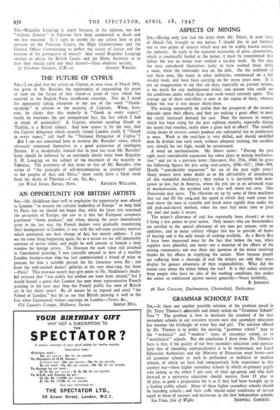ASPECTS OF MINING
Snt,—Having only just had the letter from Mr. Smart, in your issue of March 7th, brought to my notice, I should like to put forward one or two points of interest which may not be widely known outside the industry. In reply• to the repeated accusation of gross absenteeism, which is continually hurled at the miner, it must be remembered that before the war no miner ever worked a six-day week. In this area the men considered themselves lucky to have worked three shifts a week, while the remainder was on the dole. On the outbreak of war these men, like many in other industries, commenced on a full six-day week, and have been carrying on for seven years now. It is not an exaggeration to say that six days, especially on present rations, is too much for any underground miner, and anyone who could see the conditions under which these men work would certainly agree. The average age of these coal-fillers is now in the region of forty, whereas before the war it was nearer thirty-three.
The mining community do realise that the prosperity of the country depends upon their efforts, and they are making a great effort to meet the vastly increased demand for coal. Does the increase in output, which has been rising for the past eighteen months, especially during the recent bad weather, really show a gross lack of effort? The steadily rising intake of recruits cannot produce any substantial rise in production at once. Work at the coal-face is very skilled, and should unskilled men be drafted into such work, without adequate training, the accident rate, already far too high, would be accentuated.
A word on mechanisation. Mr. Smart states: "During the past eight years considerable expansion has taken place in mining mechanisa- tion " and yet in a previous letter (Spectator, Oct. 25th, 1946) he gives the following figures for pits using coal-cutters, 1938-927 ; 1944-938. Hardly "considerable expansion" for six of the past eight years! Many miners have some doubt as to the advisability of introducing all this wonderful machinery ; they realise it is inevitable with man- power so low, but in America, where the pits are in an advanced stage of mechanisation, the accident rate is also well above our own. One illustration may serve. The vibration set up by some of these machines that cut and fill the coal..and the speed at which they work cause the roof above the men to crumble and break more rapidly than under the old pick-and-shovel method, when the men had more time to prop the roof and make it secure.
The miner's allowance of coal has repeatedly been abused ; so may I bring a few points to your notice. Only miners who are householders are entitled to the special allowance of ten tons per annum, with no additions, and in many colliery villages this has to provide all forms of heating and is the only means of cooking avaifable. As a Bevin Boy I have been impressed most by the fact that before the war, when supplies were plentiful, one never saw a mention of the efforts of the mining community, nor was there any question of the miner receiving thanks for his efforts in supplying the nation. Now because people are suffering from a shortage of coal the miners are told they must display far greater athreness of their responsibilities. What did the nation care about the miner before the war? It is this unfair criticism from people who have no idea of the working conditions that makes the miner so embittered against society generally.—Yours faithfully, B. jonNsott 26 East Crescent, Duckmanton, Chesterfield, Derbyshire.


































 Previous page
Previous page